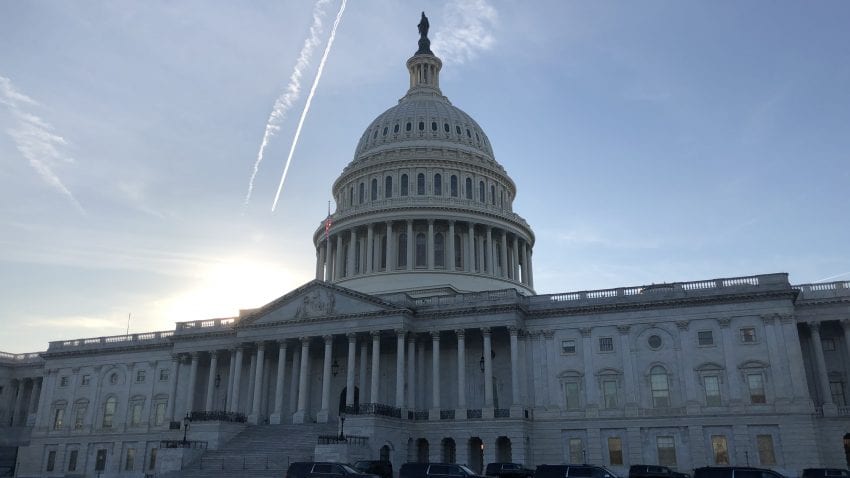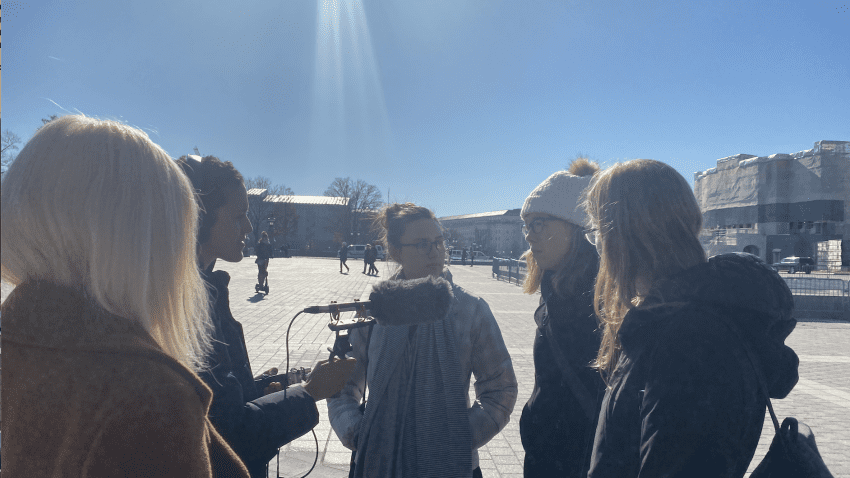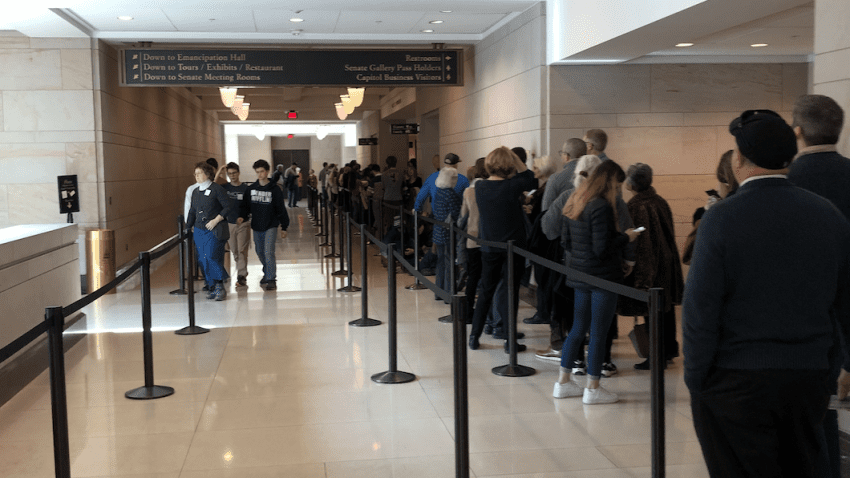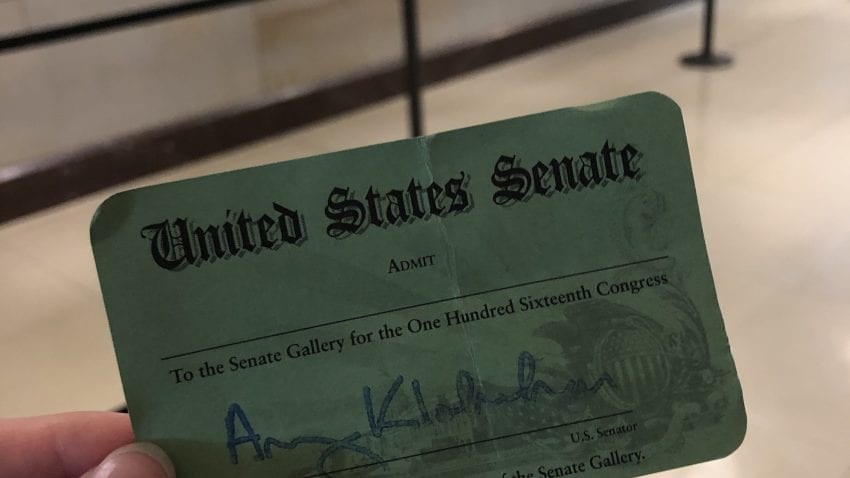In high school, I always loved history classes. I loved reading about the lives of people before me, learning about how they lived, how they thought, what they wore. They were like stories to me, narratives about the generations leading up to the now. I loved thinking about how history informed each moment today in the 21st century.
On January 22nd, I witnessed history in the making – I attended part of President Trump’s impeachment trial. I had the incredible opportunity to experience something that will one day be seen as a narrative. Perhaps seen a lesson for future politicians, or something students will read in their history books.

The Capitol – what’s happening inside?
The process of attending the trial was…complicated to say the least. After several phone calls to Minnesota Senator Tina Smith’s office this week and last, we finally discovered that the bulk of the trial would begin on Tuesday, January 21st at 1pm. We were informed that on Tuesday and Wednesday, the House Manager (Democrat Adam Schiff) would lay out the reasons for impeachment, to which President Trump’s team would respond on Thursday and Friday.
Apparently a lot of people also wanted to witness such history in the making, as we waited in line for about 3 hours to see Adam Schiff speak.
We got to the Capitol at about 11:45am and were approached by a National Public Radio reporter (NPR). She wanted to ask us a few questions about what we were hoping to see and what it was like being here in Washington D.C. at such a pivotal time. Two of our classmates were quoted in the final podcast!

Interviewed by NPR
After talking with the NPR reporter, we went into the Capitol building and found a fairly long line, so we settled in for a nice, long wait. While we waited, we started talking to the two women in front of us, who were from Louisiana, we would find out. They would become our “line friends” for the next few hours. The five of us in the St. Olaf group talked with them every so often, about everything from music to politics to Minnesota winters. At one point, our Louisiana friends were even interviewed by a journalist from a paper in Arkansas, but he was promptly reprimanded by the security guards who informed him he wasn’t allowed to interview anyone in line. So, our Louisiana friends gave him their phone numbers instead!

Lots and lots and lots of waiting
As we waited in line, we learned that they were only letting in 21 people at a time, cycling through groups every 30 minutes.
Finally, we were in the next group of 21! We were ushered into another area where we had to drop off all of our items – phones, notebooks, water, even one of our Louisiana friends had to leave her eyedrops in this item room. We were brought upstairs where we (you guessed it) waited in line again. Next step: security #2.

Shoutout to Amy Klobuchar for the gallery passes!
After security point #2, we just had to wait for our allotted time slot of 3:15pm. When our time came, we were silently shuffled into the gallery area of the Senate, walking right into the action! My group of 21 heard the very end of Adam Schiff’s introduction for the day, hearing about how, for example, those in favor of impeachment find that President Trump’s calls to Ukraine were unacceptable because they could have caused an interference in the 2020 election. Schiff also discussed how allowing such actions from President Trump was simply not democratic, wondering how we could continue as such a nation while pardoning several of his actions. He discussed how he found President Trump to have abused his position of power, outlining how it was a removable action. While we listened, we were able to see politicians running for President in 2020, including Elizabeth Warren and Bernie Sanders, as well as former candidate Kamala Harris! Plus we saw Tina Smith from Minnesota, whom we met with a few weeks ago. About 20 minutes into our time slot, they called a recess. So for our last 10 minutes in there, we talked to a security guard who told us they fairly regularly have to arrest people for protesting up in the gallery. He had arrested Jane Fonda before!
While in the room, we were not allowed to talk, stand unless we were leaving, make any approving or disapproving sounds or symbols, or take notes, among other rules. We were there to listen and observe, not participate.
While I was completely intrigued by my 30 minutes in the Senate, others in the room were not. I can’t speak for the other tourists, but I have recently been reading articles that have described the senators in the room as bored. Some Republican Senators have been itching to hear from President’s Trump team to start to “hear both sides of the story.” Senators from both sides have been seen dozing off, making paper airplanes, and playing with fidget spinners. I find this so frustrating. I fully understand that I spent 30 minutes in the Senate, whereas Senators have recently been in that room as late as 1am. Their days have been long and grueling, but, even if they already have decided which side of removal they will vote for, we are trusting our senators to evaluate on behalf of the general population, determining whether or not President Trump should be removed from office.
While we can vote for officials, we don’t get a voice in the impeachment trial, making it frustrating to know that those who do have a voice are dozing off and making paper airplanes.
As we waited in line, we heard dozens of people exclaiming that it was incredible to witness such a moment of history. But, I firmly believe that attending the trial is more than simply an “Instagramable” moment or experience to brag about. I think it’s about understanding what either outcome – to remove or not to remove from office – could mean for the fate of the country. In our interview with NPR, I said that I hoped Senators would evaluate critically and, frankly, I hold general Americans to that same standard. Yes, it is incredible to say you were there. Go ahead, Instagram it…I did! But, being in that room, I had chills constantly thinking about how these 100 people would hear the same exact things I am hearing and make a decision whether or not President Trump is guilty. Their decision could affect the 2020 election, it could affect policy for the next year until the upcoming inauguration next January, it would be the first official removal from office by impeachment.
It felt surreal being in that room with the senators. For a moment, I felt like one of them, attempting to evaluate and comprehend what we were hearing. We could experience a moment in the Senate, hear what our elected officials hear, and discover what happens behind the marble walls of the Capitol building during such a monumental time.
Works Cited:
Gathright, Jenny. January 23, 2020. “Tourists To The U.S. Capital Have a Particularly Close Vantage To Impeachment.” Podcast audio. All Things Considered. NPR. Accessed January 23, 2020. https://www.npr.org/2020/01/23/799004289/tourists-to-the-u-s-capitol-have-a-particularly-close-vantage-to-impeachment.
“Trump impeachment: Senators play games and nap during trial.” BBC News. Accessed January 23, 2020. https://www.bbc.com/news/world-us-canada-51231047
